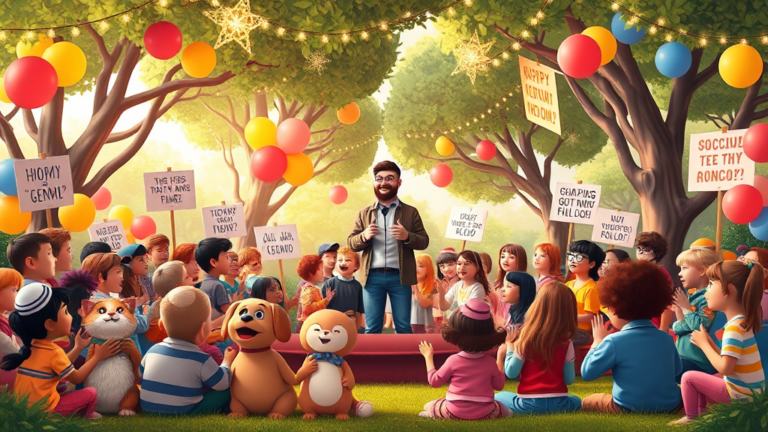Dark and Funny Jokes: Where Humor Meets the Edgy
Dark and Funny Jokes: Where Humor Meets the Edgy
SEO Title: Unpacking Dark and Funny Jokes: Why They Make Us Laugh and Squirm
Introduction
Dark and funny jokes resonate with many people, often evoking laughter that borders on the uncomfortable.
They walk a fine line between humor and taboo, allowing us to explore sensitive topics with wit and levity.
In this article, we delve into the intriguing realm of dark humor, examining its allure, cultural significance, and psychological impact.
We will also share a plethora of jokes designed to tickle your funny bone while nudging you to confront life’s absurdities.
Prepare yourself for a captivating exploration into the witty yet edgy world of humor!
Understanding Dark Humor: Definitions and Origins
Dark humor, also known as gallows humor, refers to jokes that make light of subjects typically regarded as serious or taboo.
This humor has a rich history, often stemming from difficult or painful human experiences.
For instance, the notion of laughing at death has been observed for centuries, reflecting cultural attitudes toward mortality.
Experts suggest that dark humor can provide a sense of relief, allowing individuals to process uncomfortable emotions in a manageable manner.
As comic Gary Gulman once said, “Life is grim and ridiculous, and art is a reflection of that.”
The tendency to find amusement in bleak circumstances can be traced back to ancient societies—think of ancient Greece and its blend of tragedy and comedy.
Psychologically, dark humor can act as a coping mechanism for stress and fear.
Studies reveal that laughing in the face of adversity can bolster resilience and mental well-being.
Here’s a quick overview of why dark humor catches our fancy:
- Coping Mechanism: It helps individuals deal with difficult emotions.
- Subversive Joy: It subverts societal norms and expectations.
- Shared Connection: It fosters camaraderie among those who appreciate dark humor.
- Catharsis: It allows for emotional release when confronting serious topics.
Why Do We Find Dark Jokes Funny?
Humor is a complex phenomenon that combines context, timing, and surprise.
Dark humor captivates audiences because it often involves juxtaposing light-heartedness with shock value.
When we hear a dark joke, our instinctual reaction may be a gasp, followed quickly by laughter as we process the punchline.
A study published in the journal Cognition and Emotion demonstrates that individuals who engage with dark humor often exhibit higher emotional intelligence.
This intelligence allows them to navigate between humor and discomfort effectively.
It provides an opportunity for social commentary, often highlighting absurdities in human behavior or societal failings.
Additionally, dark humor often invites a sense of shared rebellion against societal norms, breaking the ice in uncomfortable situations.
Consider some examples of witty yet dark jokes:
Sample Jokes
- Why did the scarecrow win an award? Because he was outstanding in his field—until the crows put him on their menu.
- I asked my friend for a 100% guarantee on the joke. He replied, “There’s no warranty on your sense of humor.”
- My therapist told me time heals all wounds. So why is my watch still broken?
The Role of Context in Dark Humor
Context is crucial when it comes to dark humor.
The same joke may elicit laughter in one setting while causing discomfort in another.
Cultural attitudes toward death, illness, and taboo subjects significantly impact how dark jokes are received.
For example, a dark joke might flounder in a somber funeral environment due to the solemnity of the occasion.
Conversely, such humor could thrive among close friends who share a similar understanding and appreciation for the absurdities of life.
Understanding your audience is key to delivering effective dark humor, ensuring that it lands without causing offense.
As comedian Louis C.K. notes, “There’s no such thing as bad jokes; there are just jokes that don’t land.”
Here are a few tips for using dark humor appropriately:
- Know Your Audience: Gauge who will be present and their comfort level with darker topics.
- Read the Room: Pay attention to social cues; adapt your humor to fit the environment.
- Exercise Empathy: Allow for personal stories that may have rubbed a sensitive nerve.
The Therapeutic Benefits of Dark Humor
While often viewed as controversial, dark humor can serve several therapeutic purposes.
Research shows that individuals who appreciate this type of humor show greater resilience in facing adversity.
It can help transform fear into laughter, facilitating discussions around difficult subjects such as loss, illness, or personal grief.
This cathartic release can pave the way for emotional healing and improved mental well-being.
To illustrate, psychologists highlight how depression or anxiety can sometimes be alleviated through humor, allowing individuals to reframe their perspectives on life’s challenges.
A survey conducted by the Institute for Humor Research suggests that individuals who engage with dark humor have higher levels of emotional validation and social bonding.
Some specific therapeutic advantages include:
- Stress Reduction: Dark humor reduces stress and enhances coping strategies.
- Strengthening Relationships: Shared laughter fosters connection and trust among individuals.
- Increased Resilience: It builds capacity to face challenging moments with a lighter mentality.
When Dark Humor Crosses the Line
As compelling as dark humor is, it has boundaries.
When humor turns to insensitivity or cruelty, it loses its comedic value and risks causing harm.
Each person’s threshold for acceptance varies significantly, making it an art that requires finesse and consideration.
Comedians like Kevin Hart and Dave Chappelle navigate these delicate waters skillfully, but even they have faced backlash from audiences.
For example, humor targeting marginalized groups or specific tragedies often lands poorly and perpetuates harm rather than promoting laughter.
To maintain the integrity of humor and ensure the relevance of your jokes, consider some guidelines:
- Avoid Targeting Vulnerable Groups: Jokes should not demean individuals or communities.
- Context is Everything: Ensure your joke is fitting for the environment in which it is delivered.
- Emphasize the Absurd, Not the Harm: Focus on irony rather than causing pain or distress.
Examples of Dark and Funny Jokes
In the spirit of merriment, here’s a collection of dark but amusing jokes that tread lightly on the line of taboo:
- Why did the ghost go to the party? He heard it would be a real scream—until he realized he was the only one invited.
- I wanted to lose weight, so I went to the cemetery to see all the people who died trying.
- I wish I was an octopus. So I could get eight hugs at once—one for each of my repressed emotions!
- My grandfather said my generation relies too much on technology. So I unplugged his life support for a few minutes just to highlight my point.
Creating Your Own Dark Humor
Learning to develop your own brand of dark humor can be an enjoyable pursuit.
Here are some tried-and-true strategies for crafting your own edgy jokes:
- Start with a Truth: Identify an uncomfortable truth or experience.
- Add a Twist: Play with expectations by introducing an unexpected twist in your story.
- Keep it Brief: Create a punchy statement; brevity enhances impact.
- Test Your Material: Share your jokes with friends who appreciate dark humor before going public.
Conclusion
Dark and funny jokes encapsulate humor’s ability to navigate sensitive subjects with wit and cleverness.
They invite us to laugh in the face of adversity, enabling us to embrace life’s darkest aspects from a lighter perspective.
This article has showcased the complexities of dark humor, the psychological benefits of engaging with it, and some examples to guide you in your own pursuits.
Ultimately, the beauty of dark humor lies in its ability to foster connections while providing a communal space for healing through laughter.
As we wrap up, let’s continue to celebrate this unique form of comic relief that resonates with our deepest fears and desires for joy.
Frequently Asked Questions (FAQ)
What is dark humor?
Dark humor is a type of humor that makes light of subjects typically considered serious or taboo, such as death, illness, or tragedy.
It often serves as a coping mechanism, allowing individuals to process difficult emotions while eliciting laughter.
Is dark humor offensive?
While dark humor can be perceived as offensive, its acceptability depends on context, audience, and delivery.
When appropriately used, it can provide comedic relief; however, it may also risk causing harm if used insensitively or improperly.
How can I create my own dark jokes?
To craft your own dark jokes, start with an uncomfortable truth, add an unexpected twist, keep it brief, and test it out with friends.
This trial-and-error approach allows you to refine your material and gauge its reception.
What are some tips for using dark humor effectively?
Consider knowing your audience, reading the room, and exercising empathy.
These strategies help ensure your humor resonates positively without crossing sensitive boundaries.
If you’ve enjoyed dark humor or have jokes to share, don’t hesitate to leave your thoughts or experiences in the comments.
Laughter is a part of the human experience, and sharing it enriches our connections and understanding of life’s many absurdities!






